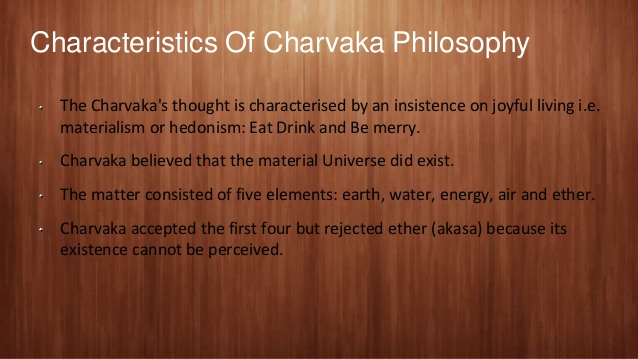
a Rakshasa of the
p. 82
name of Charvaka, who had disguised himself as a Brahmana, addressed the king. He was a friend of Duryodhana and stood therein the garb of a religious mendicant. With a rosary, with a tuft of hair on his head, and with the triple staff in his hand, he stood proudly and fearlessly in the midst of all those Brahmanas that had come there for pronouncing benedictions (upon the king), numbering by thousands, O king, and all of whom were devoted to penances and vows. That wicked wight, desirous of evil unto the high-souled Pandavas and without having consulted those Brahmanas, said these words unto the king.'
"Charvaka said, 'All these Brahmanas, making me their spokesman, are saying, 'Fie on thee! Thou art a wicked king. Thou art a slayer of kinsmen. What shalt thou gain, O son of Kunti, by having thus exterminated thy race? Having slain also thy superiors and preceptor, it is proper for thee to cast away thy life.' Hearing these words of that wicked Rakshasa the Brahmanas there became deeply agitated. Stung by that speech, they made a loud uproar. And all of them, with king Yudhishthira. O monarch, became speechless from anxiety and shame.'
"Yudhishthira said, 'I bow down to you and beseech you humbly, be gratified with me. It doth not behove you to cry fie on me. I shall soon lay down my life.' 1
"Vaisampayana continued, 'Then all those Brahmanas, O king, loudly said, 'These are not our words. Prosperity to thee, O monarch!' Those high-souled persons, conversant with the Vedas, with understanding rendered clear by penances, then penetrated the disguise of the speaker by means of their spiritual sight.' And they said, 'This is the Rakshasa Charvaka, the friend of Duryodhana. Having put on the garb of a religious mendicant, he seeks the good of his friend Duryodhana. We have not, O thou of righteous soul, said anything of the kind. Let this anxiety of thine be dispelled. Let prosperity attend upon thee with thy brothers.'
"Vaisampayana continued, 'These Brahmanas then, insensate with rage, uttered the sound Hun. Cleansed of all sins, they censured the sinful Rakshasa and slew him there (with that very sound). Consumed by the energy of those utterers of Brahma, Charvaka fell down dead, like a tree with all its sprouts blasted by the thunder of Indra. Duly worshipped, the Brahmanas went away, having gladdened the king with their benedictions. The royal son of Pandu also, with all his friends, felt great happiness.
http://www.sacred-texts.com/hin/m12/m12a038.htm
"Vaisampayana said, 'Then Devaki's son Janardana of universal knowledge addressed king Yudhishthira who stood there with his brothers, saying, 'In this world, O sire, Brahmanas are always the objects of worship with me. They are gods on earth having poison in their speech, and are exceedingly easy to gratify. Formerly, in the Krita age, O king, a Rakshasa of the name of Charvaka, O mighty-armed one, performed austere penances for many years in Vadari. Brahman repeatedly solicited him to ask for boons. At last the Rakshasa solicited the boon, O Bharata, of immunity from fear at the hand of every being in the universe. The Lord of the universe gave that high boon of immunity from fear at the hands of all creatures, subject to the only limitation that he should be careful of how he offended the Brahmanas. Having obtained that boon, the sinful and mighty Rakshasa of fierce deeds and great prowess began to give pain to the gods. The gods, persecuted by the might of the Rakshasa, assembling together, approached Brahman, for compassing their foe's destruction. The eternal and unchangeable god answered them, O Bharata, saying, 'I have already arranged the means by which the death of this Rakshasa may soon be brought about. There will be a king of the name of Duryodhana. Among men, he will be the friend of this wight. Bound by affection towards him, the Rakshasa will insult the Brahmanas. Stung by the wrong he will inflict upon them, the Brahmanas, whose might consists in speech, will in wrath censure him at which he will meet with destruction. Even that Rakshasa Charvaka, O foremost of kings, slain by the curse of the Brahmanas, lies there deprived of life. Do not, O bull of Bharata's race, give way to grief. The kinsmen, O king, have all perished in the observance of Kshatriya duties. Those butts among Kshatriyas, those high-souled heroes, have all gone to heaven. Do thou attend to thy duties now. O thou of unfading glory, let no grief be thine. Stay thy foes, protect thy subjects, and worship the Brahmanas.'"
http://www.sacred-texts.com/hin/m12/m12a039.htm







































